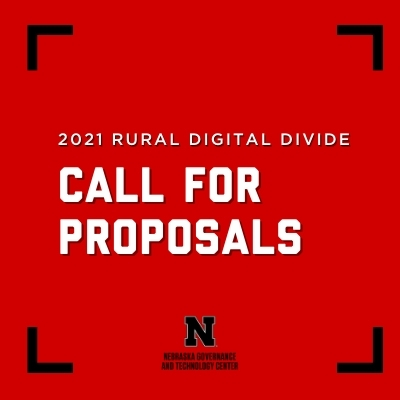Tue, 12/15/2020
The Nebraska Governance & Technology Center and Space, Cyber, and Telecom Law Program are pleased to announce this call for research proposals for projects relating to the rural digital divide. This call for proposals is undertaken in conjunction with the Space, Cyber, and Telecom Law Program’s annual Rural Digital Divide Roundtable.
Each spring we convene a group of 40-50 regional and national stakeholders – including users, service providers, academics, and policy makers – for a two day discussion of the rural digital divide. Details about this year’s roundtable will be announced in the coming months. This year we expect to convene virtually, likely in late April.
In conjunction with the roundtable, we are happy to release this call for research proposals. This year we will provide funding to support 6-8 research projects relating to empirical or near-empirical aspects of the rural digital divide. Authors of selected projects will receive a $6,000 honorarium to support their work. Further may funding is available on a case-by-case basis to support specific research costs, such as access to data, materials, or equipment.
Details on submitting proposals are below. Proposals are due by January 25, 2021.
The call for proposals is open to any topic relating to the rural digital divide. A non-exhaustive list of examples of specific topics that we are interested in supporting this year includes:
- Assessments of CAF-II deployment benchmarks. As we approach three years since the end of the CAF-II auction, are winners of CAF-II support meeting their build-out commitments? How does build-out vary by winner, by winning technology, by region, &c? How is CAF-II funding affecting deployment by non-CAF-supported providers?
- Will satellite eat the world. As Starlink enters public use, it is offering impressive initial performance numbers. How will this platform affect discussions of the rural digital divide? In particular, how will it affect discussions of funding mechanisms such as the USF?
- Universal Service in Unusual Places. Most discussions of the rural digital divide focus on last-mile connectivity. There are regions of the country and world, however, where the middle-mile and backbone are the connectivity bottlenecks (e.g., much of Alaska); some farming and ranching communities in the plains or mountain west. How, and should, we use Universal Service funding to connect communities subject to middle-mile and backbone bottlenecks?
- Real-time speed monitoring. As 100-mbps and 1-gbps Internet access becomes relatively common, we are entering a period where many households have greater bandwidth that they are likely to consume. Yet most performance measurement tools (such as speed tests) focus on peak potential speeds. While useful, it is at least as important to understand peak actual speeds: e.g., what are the (50th, 85th, 95th, 99th percentile) peak speeds actually observed on residential Internet connections over the course of a month, where the connection itself is not a bottleneck. How can this data be obtained? What are its limitations and uses?
- Universal Service’s Spillovers. The driving purpose of Universal Service funding has been to provide access to end users and anchor institutions. But does it have other spillover effects, such as pushing fiber and other backbone and middle-mile further out from the center of the network (which may reduce costs for services not directly supported by USF, including business-class services and wireless backhaul)? Note the potential overlap between this topic and the previous one (e.g., if satellite is able to satisfy the primary goals of the USF, will secondary goals be left unmet?)
- Pandemic Lessons Learned. The tragedy of the COVID-19 pandemic has been a natural experiment that may shed light on any number of open policy issues. We are generally interested in proposals that would find beneficial use of data created by the pandemic. This may include, for instance, substantive topics such as social needs that telecom infrastructure needs to support and our ability to deploy new infrastructure on a just-in-time or as-needed basis, demand elasticity estimates treating the pandemic as exogenous shock to demand, and also procedural topics such as regulatory responses to the pandemic.
We welcome proposals for these and other topics from any researchers working in these areas. This includes, for instance, academics from a range of disciplines (law, political science, economics, engineering, business, history, sociology, &c), industry-affiliated researchers, individuals from think tanks, and government-affiliated researchers. Interdisciplinary research is particularly encouraged.
Proposals should be submitted as a 1-2 page (400-600 word) narrative description of the project. The narrative should explain the specific research question and methodology, and provide some detail as to the authors’ approach to developing the project. It should also identify any anticipated challenges that the authors expect to encounter and their approaches to addressing them. If authors expect to need access to data or other resources to complete their research, the narrative should discuss these needs and how they will be addressed. A brief biography of each author should be included (which is not counted against the word limit; academic or research CVs are suitable in place of a biography).
Selected projects will be expected to have initial results or drafts sufficient for presentation and discussion completed by the spring roundtable. These do not need to be complete or final projects. They should, however, be sufficient to present to an audience of subject matter experts for critical engagement.
In addition to receiving a $6,000 honorarium, selected projects are also strongly encouraged to submit their work to other relevant conferences and workshops, such as the annual TPRC conference. To encourage authors to submit their work widely, we will generally cover any submission or conference registration fees.
To submit a proposal, click here. Questions about this call for research proposals should be directed to Elsbeth Magilton at elsbeth@unl.edu.
